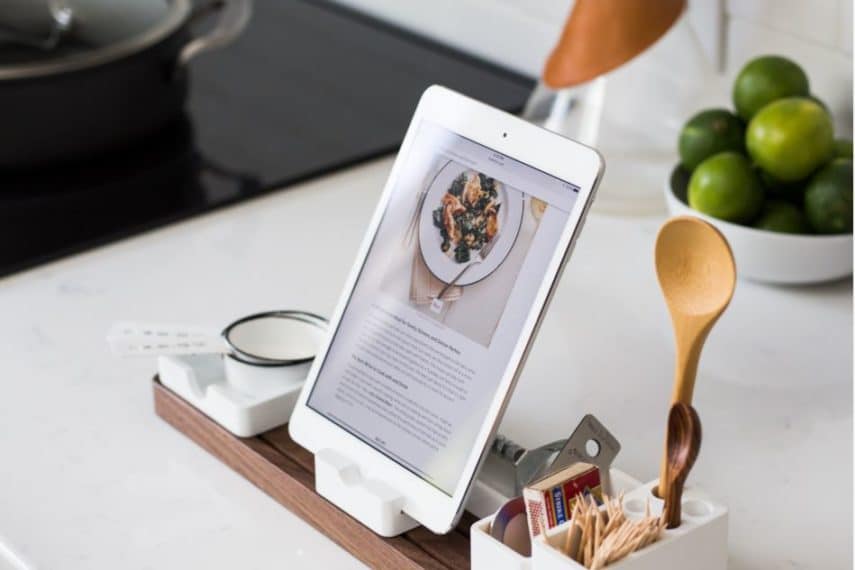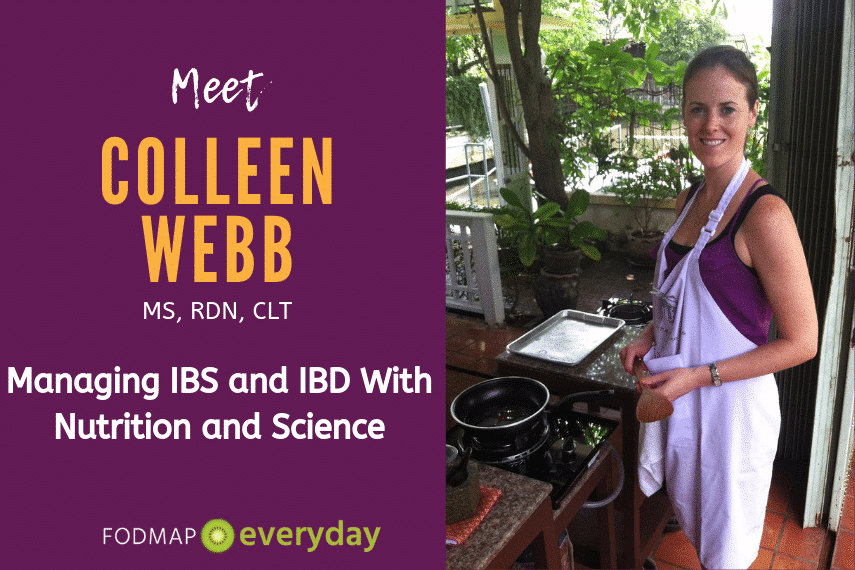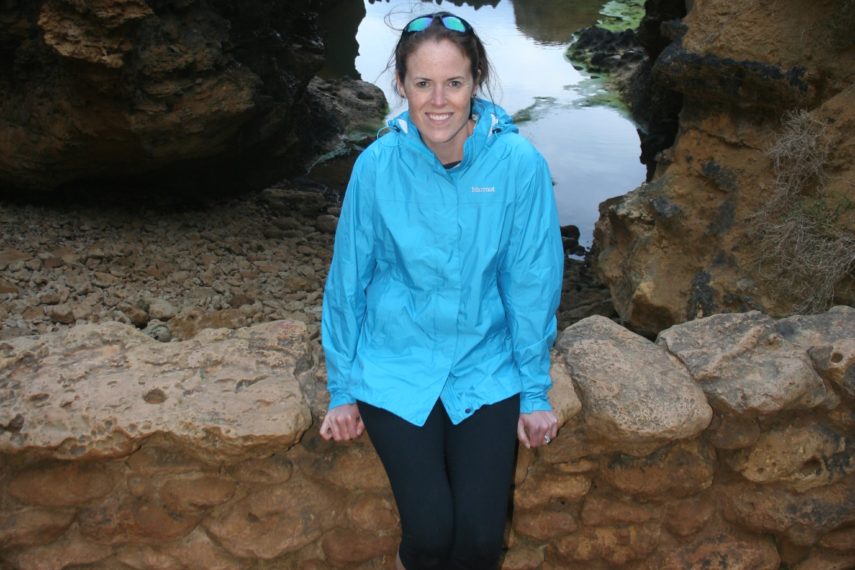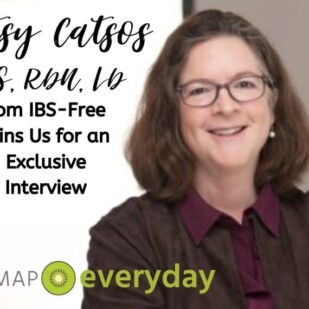Welcome Colleen!
We want to welcome Colleen Webb MS RDN to our Success Team and cannot wait for you to get to know her better. Colleen works with clients with IBS, uses the low FODMAP diet in her practice and has a particular focus on IBD (inflammatory bowel disease), Crohn’s disease and ulcerative colitis.
She is very interested in helping people figure out what real, whole foods they can eat, while taming their GI symptoms, all of which makes her a perfect fit for the FODMAP Everyday® Success Team. Let’s dive in!
Dédé Wilson: Colleen! This feels like it has been a long time in coming! We had connected when we started FODMAP Everyday® and we have always been interested in your work. We would love you to tell our community, in your own words, what your interests are and your approach. And tell us a little about your connection to the Weill Cornell Medical Center, and also where you are located, for those lucky enough to be able to work with you personally.
Thanks, Dédé! I’m so excited to join the FODMAP Everyday® Success Team.
I specialize in providing nutrition counseling to people with complex gastrointestinal issues, such as IBD, IBS, SIBO, and food sensitivities. I am a nutritionist, but often feel like a detective. I believe that to fix the gut, we must correct the underlying problems. So I work closely with my patients and their physicians to identify and correct these issues. Sometimes this approach requires a food elimination diet, like the low FODMAP diet. Ultimately, my goal is to improve my patients’ health so they can eat a wide variety of delicious and nutritious foods. I believe that enjoying what you eat is essential for health and happiness.
I spent over eight years working as a registered dietitian nutritionist at the IBD Center at Weill Cornell in New York City. There I counseled patients and established nutrition education and mentorship program for physicians, medical students, and graduate-level nutrition students to learn more about nutrition’s role in managing IBD and other gastrointestinal conditions.
Earlier this year I resigned from Weill Cornell to focus on family, private practice, teaching, and Wellness By Food, a nutrition and lifestyle resource for people with IBD.
How did you come to focus on IBD, Crohn’s and ulcerative colitis? And can you talk a little about how these medical conditions are very different from functional gastrointestinal disorders such as IBS?
After my internship I interviewed with the head gastroenterologist at the IBD Center for the role of clinical nutritionist. She was (and is) passionate about the importance of nutrition for gut health and I knew I wanted to work with her. So began my specialization in gut health with a focus on IBD.
Both IBD and IBS are GI disorders with unknown causes and mechanisms.
IBD is a chronic, systemic, relapsing immune-mediated inflammation of the intestinal tract. The two main types of IBD are Crohn’s disease and ulcerative colitis.
People with IBD often have overlapping IBS.
These two conditions have a lot in common. Both involve the gut-brain axis, genetics, an abnormal gut microbiota and increased gut permeability, better known as “leaky gut” among the general population. Many of the signs and symptoms are the same, too. But, people with IBD suffer from more severe inflammation, which takes longer to resolve and can require medical and surgical interventions. IBS can present with low-grade mucosal inflammation or none at all. Unlike IBD, IBS is not treated with anti-inflammatory medications or surgical interventions.
Was it apparent to you immediately that there was a need for a RD who could bring more real-life, real-food help to those clients? When and how did your awareness of the low FODMAP diet come in?
YES! Within a short time of working with IBD patients I learned that the three most common pieces of advice patients hear from healthcare providers include “food has nothing to do with your disease”, “eat whatever you want that doesn’t bother you,” and “avoid all fruits and vegetables.” Most patients know that what they eat has a lot to do with their IBD so they end up seeking information from non-professionals on social media and the Internet.
How did the low FODMAP diet change your approach? Or, how did you integrate it to your approach?
Doctors were referring a lot of patients for abdominal bloating and excessive flatulence. Both women and men reported looking pregnant despite eating well and exercising. These annoying and uncomfortable symptoms persisted during IBD remission, when the disease was inactive.
Medications weren’t helping. This was back in 2011 when the low FODMAP diet wasn’t as popular as it is now. Fortunately, I belonged to a group of seasoned RDs who specialized in gastrointestinal health. There I discovered low FODMAP resources from Kate Scarlata and Patsy Catsos. I recommended the low FODMAP diet to my patients with and without IBD who complained of bloating, and it was an instant success.
Colleen Webb enjoying the outdoors. Welcome Colleen to the team!
Now that we have built up our community, we know that there is a need and an interest in where IBS and IBD overlap. What percentages of your clients that have IBD also have IBS?
I’d guess that around 50% of my IBD patients have overlapping IBS. I’ve seen research articles estimate closer to 40%. We don’t know the exact percentage, but it’s significant.
Can you talk a little about what a low roughage diet is? Is it the same as low residue? How does someone know that this is a diet that they need?
Most healthcare providers use “low roughage”, “low residue” and “low fiber” interchangeably. I prefer “low roughage” because it speaks to the texture of the food.
Roughage includes most raw vegetables, whole nuts, whole seeds, popcorn, and thick skins of fruits and vegetables. We don’t break down roughage more than we can chew it, so it travels throughout the intestinal tract more or less intact. For example, an apple with its skin is high roughage, but a peeled apple is low roughage. The inside of the apple has fiber, but it’s soft fiber, not rough.
Oh, that’s such a clarifying example! Thank you for that explanation.
Roughage can lead to abdominal pain, bloating and diarrhea or constipation in people with active IBD, diverticulitis, redundant colons, and sensitive guts. Those with stricturing Crohn’s disease or scar tissue secondary to inflammation or prior GI surgeries need to be extra mindful of roughage as it can get stuck in a narrowed GI tract.
I have never heard the term redundant colon. What is that?
A redundant colon is an abnormally long colon. You might hear it referred to as an elongated colon or a tortuous colon. A redundant colon has more twists and turns so it’s harder for food to pass. Therefore, people with redundant colons might have constipation, abdominal pain and bloating. It’s rarely serious and some people experience no symptoms at all. This condition is more common in women because women are born with longer colons.
Now, just as the low FODMAP diet ultimately looks different for every person (once they finished their Elimination and Challenge Phases) can you please talk a little about how the same is true for IBD patients? Please describe the process through which you determine their needs. And tell us about your “Eating with IBD: The Essentials”.
There’s no one-size-fits-all diet for IBD, but nutrition and lifestyle are important for disease management. The incorrect, misleading and harmful information about nutrition and IBD circulating the Internet, medical communities and elsewhere frustrated me. That’s why my WBF team and I combined research and clinical and personal experience to create the eBook, Eating With IBD: The Essentials.
[bctt tweet=”There’s no one-size-fits-all diet for IBD, but nutrition and lifestyle are important for disease management.” username=”FODMAPeveryday”]
Eating With IBD: The Essentials is a guide to help patients discover what foods are best for them. It’s an introduction to eating with IBD for patients with inactive, mild or moderate disease. It includes a deeper look into how food impacts IBD, a “Should I Eat This? list,” a month’s worth of meal suggestions with easy-to-make recipes, and practical everyday tips.

Colleen, we are thrilled that you are coming on board. Welcome! We look forward to creating great content together. Our collective focus on helping people heal through diet is a perfect match.
Be sure to check out Colleen’s articles here.
We think you enjoy her article on where IBS and IBD intersect.










Can you make a recommendation for a dietitian / nutritionist in my area?
Our global directory is updated quarterly. Also, some RDs provide Skype and phone consult, so it makes sense to reach out to a few.
https://www.fodmapeveryday.com/resources/registered-dietitian-directory/